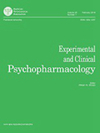Experimental and Clinical Psychopharmacology seeks to promote the discipline of psychopharmacology in its fullest diversity. Psychopharmacology necessarily involves behavioral change, psychological processes, or their physiological substrates as one central variable and psychopharmacological agents as a second central variable. Such agents will include drugs, medications, and chemicals encountered in the workplace or environment. One goal of the journal is to foster basic research and the development of theory in psychopharmacology. Another is to encourage the integration of basic and applied research, the development of better treatments for drug abuse, and more effective pharmacotherapeutics. To this end, the journal publishes original empirical research involving animals or humans that spans (a) behavioral pharmacology research on social, behavioral, cognitive, emotional, physiological, and neurochemical toxicity; (b) descriptive and experimental studies of drug abuse, including its etiology, progression, adverse effects, and behavioral and pharmacological treatment; and (c) controlled clinical trials that, in addition to improving the effectiveness, range, or depth of application, will increase our understanding of psychological functions or their drug modulation. The journal also publishes theoretical and integrative analyses and reviews that promote our understanding and further systematic research in psychopharmacology. The journal also publishes papers in two other sections, Innovations and Remarks. Innovations is an occasional section that will highlight papers that establish a novel method, a novel result, a novel measure, or a new theory. Commentary may be solicited to address the nature of the innovation and to provide contrasting views. Remarks is another occasional section. The purpose of "remarks" is for brief commentary about important aspects of the field that have not been previously addressed or considered. Remarks could address either empirical or theoretical issues. Remarks are expected to be erudite, integrative, substantive, and thoughtful. Although case studies are not appropriate, occasional small sample experiments with special populations may be considered. The journal is intended to be informative and useful to both basic and applied researchers and to practitioners operating in varied settings. Experimental and Clinical Psychopharmacology seeks to be the vehicle for the best research ideas and for integrating pharmacology and behavior.
